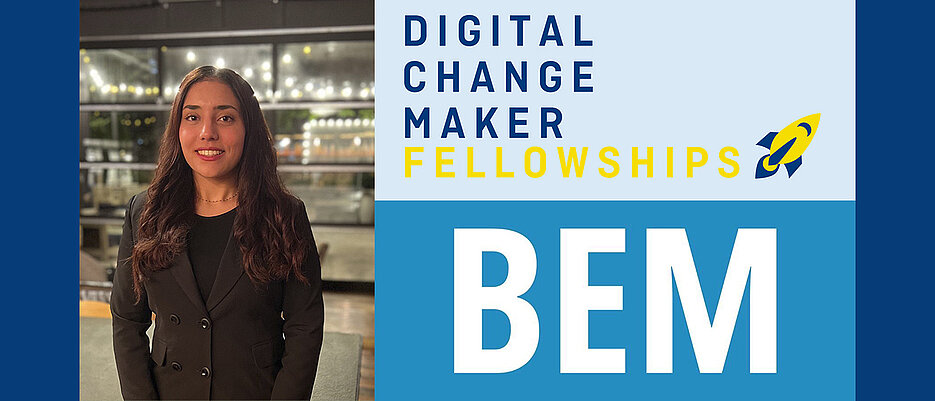More Digitalization in Medicine
22.09.2023Salma Abosabie is in her seventh semester of studying medicine at the University of Würzburg. In a team of three, she successfully applied for a scholarship that aims to advance digitalization in medicine.

"I think that digital transformation is already strongly shaping many scientific fields but is not yet that prominent in medicine. It is high time we acted proactively to change that." Salma Abosabie explains. To start this change, she applied for a DigitalChangeMaker Fellowship (DCM fellowship) from the Stifterverband and the Reinhard Frank Foundation – and her project was accepted.
Together with Jaron Steiner (Charité University Hospital Berlin) and Tanja He (Heidelberg University), the Würzburg medical student will develop an online lecture series as part of her project "Impact of Artificial Intelligence on scientific quality assurance and peer review”, which will focus on the influence of AI on the peer review process and scientific quality assurance.
Idea Was a Team Effort
At the Julius-Maximilians-Universität Würzburg (JMU), the 23-year-old is studying medicine in her seventh semester and is also enrolled in the master's program in translational medicine in her second semester. The Masters program of translational medicine is one of the few Elite study Programs offered in Bavarian universities. There, the focus is on successfully linking patient care with medical research - a key issue for Salma Abosabie. “Translational Research is all about taking a discovery from the laboratory’s bench to the patient’s bedside”, she explains. In her future she sees a career of being a Physician-Scientist, bridging the gap between the two worlds of Medicine and Science.
Salma Abosabie sees a lot of potential for digitization in medicine and wants to actively contribute to this development: "That's why I specifically looked for funding in precisely this area and that is how I came across the DCM program."
Since the funding is awarded to teams of two or three students, Salma sought support from like-minded people: "I am part of a student organization called Berlin Exchange Medicine (BEM). We support medical students, motivate them to publish more scientific papers, help them to better understand the peer review process, and promote Open Science."
Through discussions with the BEM team, the project idea came to light and the project team was formed. When asked about her application and project journey, Salma Abosabie highlights that “alongside dedication and a clear project vision, working with motivated team members who truly believe in the project idea, has been our recipe to success”.
Five Phases to the Project: From Literature Review to Publishing on an Open Education Platform
The approval of the application was a great success for Salma and Berlin Exchange Medicine: "It's a great feeling to know that the ideas we're working on are being taken seriously and are getting support," says the student.
Now, a lecture series is to be created in five phases and will finally be made available on an open education platform: "Our basic idea is that peer review is a very subjective process that could be objectified and standardized through AI." After kicking off in August, the project is currently in its first phase, where content is being collected and prepared, and potential guest speakers are being contacted.
Marketing, spreading the word about the lecture series, and first delivery of the lectures are then to follow. "After preparing the content for the lectures and delivering them in the form of online webinars, we want to collect feedback, improve the lectures accordingly, and finally record them and make the course, consisting of 5 lectures, freely available on an open education platform" says Salma, explaining the project plan for the next twelve months.
One of the ways the team will get support is through peer groups. Here, the funded groups share their progress on a monthly basis and are intended to inspire each other. In addition to this non-material funding, the DigitalChangeMaker Fellowship will support the accepted projects with 1,200 Euros allocated for each project. Salma sees possible uses of the funding amount, for example, in the course publication process and the purchase of software for the design of lecture content.
From Egypt to German Medicine
For Salma, who was born in Egypt, it was clear early on that she wanted to study medicine in Germany one day. She cites the well-structured healthcare system and the high quality of education as reasons for her desire. After graduating high school with the Cambridge International GCE and A Levels, she studied medicine for a year in her home country and learnt German before moving to Germany and the University of Würzburg.
After passing her first Staatsexamen (standardized German Medical state examination) in 2022, Salma is currently working on her medical doctoral thesis, which deals with hematological and oncological diseases. She is writing it at the Yale Cancer Center at Yale University in the United States.
DigitalChangeMaker Accelerators 2023
By awarding DigitalChangeMaker Fellowships, the Stifterverband and the Reinhard Frank Foundation offer a support program in which students are systematically empowered as change agents and given accompanying support in the implementation of their own change projects. The fellowship program runs for four months and is aimed at student tandems or trios who want to help shape the digital transformation at universities with their original project ideas.







